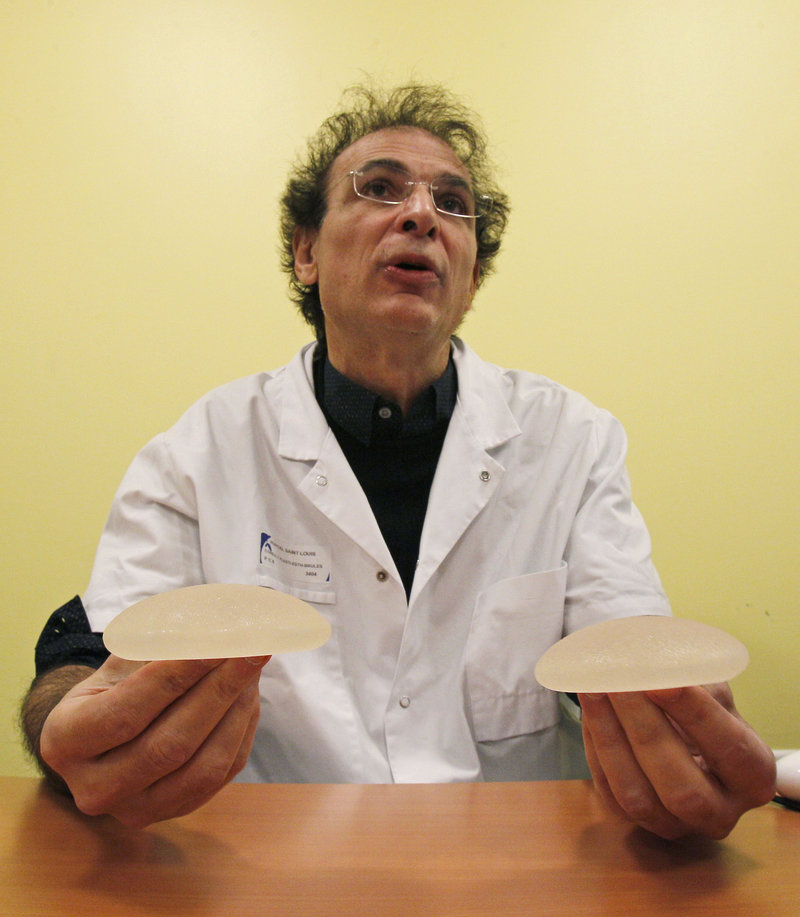PARIS – Emmanuelle Maria’s breasts were burning and globules of silicone gel were protruding into her armpits. Her implants had exploded inside her. Yet her doctors, she says, told her nothing was wrong.
Now she wants the French government to tell 30,000 women to get their implants removed — at the state’s expense — to call attention to their risks and save others from potential pain.
Prompted by calls from implant wearers and leading doctors, French health authorities are considering a drastic and unprecedented move: recommending mass surgery to rid the country of a type of breast implant that investigators say was secretly made with cheap industrial silicone whose medical dangers remain unclear.
Governments around Europe are hanging on France’s decision, expected Friday. Tens of thousands more women in Britain, Italy, Spain and other European nations are walking around with the same pre-filled implants, made by the now-defunct French company Poly Implant Prothese, or PIP.
Health officials from several European countries held a conference call Wednesday to discuss the implants, Portugal’s Director-General of Health, Dr. Francisco Jorge, told The Associated Press. European Commission spokesman Frederic Vincent said no decisions were made, but France informed the others of the situation.
The main concern in France is the risk of rupture — more than 1,000 of the 30,000 such implants in France have burst, according to the French health safety agency AFSSAPS — and uncertainty over what risks the suspected industrial silicone gel could pose when it leaks inside the body.
Meanwhile, eight cases of cancer among women with the implants, including one who died in November, have crystallized concerns and heightened pressure on the government to take action. Friday’s government decision will depend partly on guidance from the French National Cancer Institute.
The implants in question were not sold in the U.S., where concerns about silicone gel implants overall led to a 14-year ban on their use. Silicone implants were brought back to the market in 2006 after research ruled out cancer, lupus and some other concerns.
In Britain, the law firm Hugh James solicitors said it is acting for more than 250 women with PIP implants who are trying to sue clinics that provided the surgery. In a statement, the firm said the news have been worrying to its clients, many of whom “have already suffered terrible problems as a result of their implants,” including ruptures and leakages.
Still, British health authorities say they see no reason so far to have the French-made implants systematically removed, and have said that there is not enough evidence of a link between silicone implants and cancer. Italy’s Health Ministry is holding a meeting today to discuss the French-made implants.
Plastic surgeon Maurice Mimoun of Paris’ Saint Louis Hospital said a rupture could leak the silicone gel internally. That in turn could require surgery on other parts of the body to remove it.
“The problem is these implants are made with a gel that we don’t know,” he said in an interview. “Once these implants are removed, the story is not over … we don’t know” if there might be other consequences, he said.
Women have filed more than 2,000 legal complaints since the implants were recalled last year, and an investigation into officials at PIP is under way. Investigators suspect the company used cheaper industrial silicone instead of silicone meant for medical use in the implants, cutting costs by up to (euro) 1 million ($1.3 million) a year.
The company has suspended its activities and is being liquidated. Its phones are no longer functioning and emails sent to its staff were not answered.
Implant wearer Maria described wanting new breasts to improve her self-image after an adolescence troubled by a bone disease that left her covered in scars. She was given the PIP silicone implants in 2007, and started developing burning pains in early 2010.
She consulted her surgeon and another specialist he recommended. “They told me, ‘There’s nothing wrong,”‘ she recounted.
Maria then went to two other doctors, who confirmed that both implants had burst, and she had them removed.
“The product is dangerous. They told us there was nothing toxic,” Maria said. She accused the company and surgeons of “playing Russian roulette with the health of others.”
Send questions/comments to the editors.



Comments are no longer available on this story